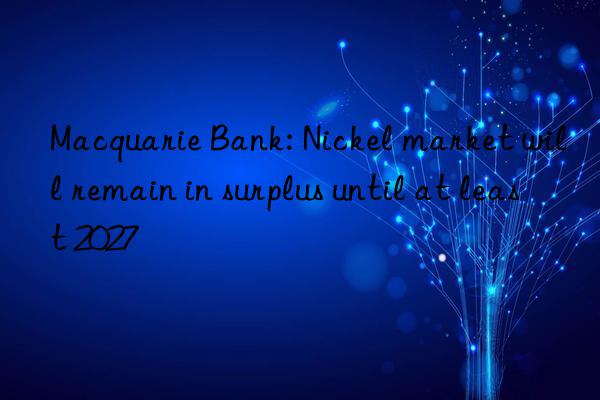
Foreign media news on June 1: Macquarie (Macquarie) analysts said that with the rapid increase of Indonesian production, the global nickel market will face a supply surplus every year until at least 2027.
Indonesia is rich in nickel ore resources and the government's policy to encourage domestic processing has led to rapid growth in Indonesia's output of nickel metal, which is used to make stainless steel and electric vehicle (EV) batteries, in recent years.
Data provided by Macquarie analyst Jim Lennon showed the nickel market could be in surplus of 142,000 tonnes this year, up from 111,000 tonnes in 2022, when global supply growth is record, with much of it coming from Indonesia.
Lenon told the Indonesia Nickel and Cobalt Conference in Jakarta that the glut would widen to 187,000 tonnes by 2026 before shrinking to 40,000 tonnes in 2027, with most of the increase being low-grade "Tier 2" nickel.
Ricardo Ferreira, director of research at the International Nickel Study Group (INGS), told the same conference that the group also found a large surplus of primary nickel this year, estimated at 293,300 tonnes, higher than the surplus in 2022 The volume is 105,200 tons.
Lenon said Indonesia produced about 1.45 million tonnes of nickel last year, but if all projects are added up, the total capacity of existing, planned and under-construction projects exceeds 5 million tonnes. Taken together, the total amount of nickel ore mining last year was 3 million tons.
Indonesia's nickel production could reach more than 75% of world supply by 2029, which could pose a challenge to nickel users in Europe and the US as governments seek to localize.
INSG's Ferreira said nickel is still mainly used in the stainless steel industry, but demand for the metal from the battery industry is rising steadily, rising from 8% of total nickel consumption in 2020 to 15% last year.
Macquarie's Lennon said demand for nickel in the battery sector could nearly quadruple to 1.69 million tonnes by 2030, from 484,000 tonnes in 2022. But nickel sulphate, a chemical used to make electric vehicle batteries, is trading at a steep discount to the global benchmark nickel price on the London Metal Exchange CMNI3, pointing to oversupply, he said.



 微信扫一扫打赏
微信扫一扫打赏
